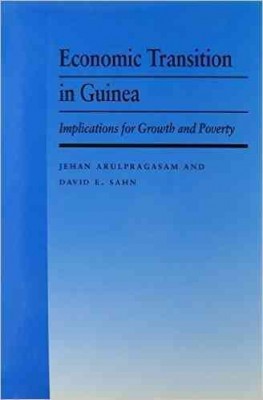| Economic Transition in Guinea Contributor(s): Arulpragasam, Jehan (Editor), Sahn, David E. (Author) |
|
 |
ISBN: 0814706649 ISBN-13: 9780814706640 Publisher: New York University Press OUR PRICE: $88.11 Product Type: Hardcover Published: November 1996 Annotation: Culling data from the World Bank, the International Monetary Fund, the United Nations, and numerous interviews and previously unpublished government data, Jehan Arulpragasam and David E. Sahn here present an overview of the Guinean economy and its evolution - from independence, through crisis, to reformand model the implications of these changes for economic performance and living standards of the poor. Highlighting the chasm between theory and practice, between well-intentioned program and problematic implementation, the authors reveal how Guinea both parallels and contradicts past experiences of economic reform in Africa. Most notably, reform in Guinea has been hindered by the weighty administrative, managerial, and logistical demands of undertaking a vast battery of economic adjustments, all in one fell swoop. The most detailed and informative study of the Guinean economy to date, Economic Transition in Guinea illustrates not only the successes of the nation's reform agenda, but also the fundamental constraints to development that often lie beyond the reach of such reform. |
| Additional Information |
| BISAC Categories: - Business & Economics | Development - Economic Development - Business & Economics | International - General |
| Dewey: 338.966 |
| LCCN: 96009056 |
| Series: Cornell Food and Nutrition |
| Physical Information: 0.69" H x 6" W x 9" (1.07 lbs) 236 pages |
| Descriptions, Reviews, Etc. |
| Publisher Description: In recent years, the Republic of Guinea has shed its reputation as one of the most tightly controlled state economies in Africa, leaving behind a cloistered era marked by an extraordinarily closed economic and political system. In breaking with its dismal past, Guinea has launched an ambitious program of reform which has affected the entire range of the country's institutions, regulations, and markets. |
Contributor Bio(s): Arulpragasam, Jehan: - Jehan Arulpragasam is an economist with the Southern Africa department of the World Bank where he works on Mozambique in the macro, industry, and finance division. He holds a Ph.D. from the University of North Carolina.Sahn, David E.: - David E. Sahn is Associate Professor of Economics at Cornell University and also serves as Director of the Cornell Food and Nutrition Policy Program. The author of numerous books and articles on economic development, he holds a Ph.D. from the Massachusetts Institute of Technology and has previously been a Research Fellow at the International Food Policy Research Institute in Washington, D. C. |